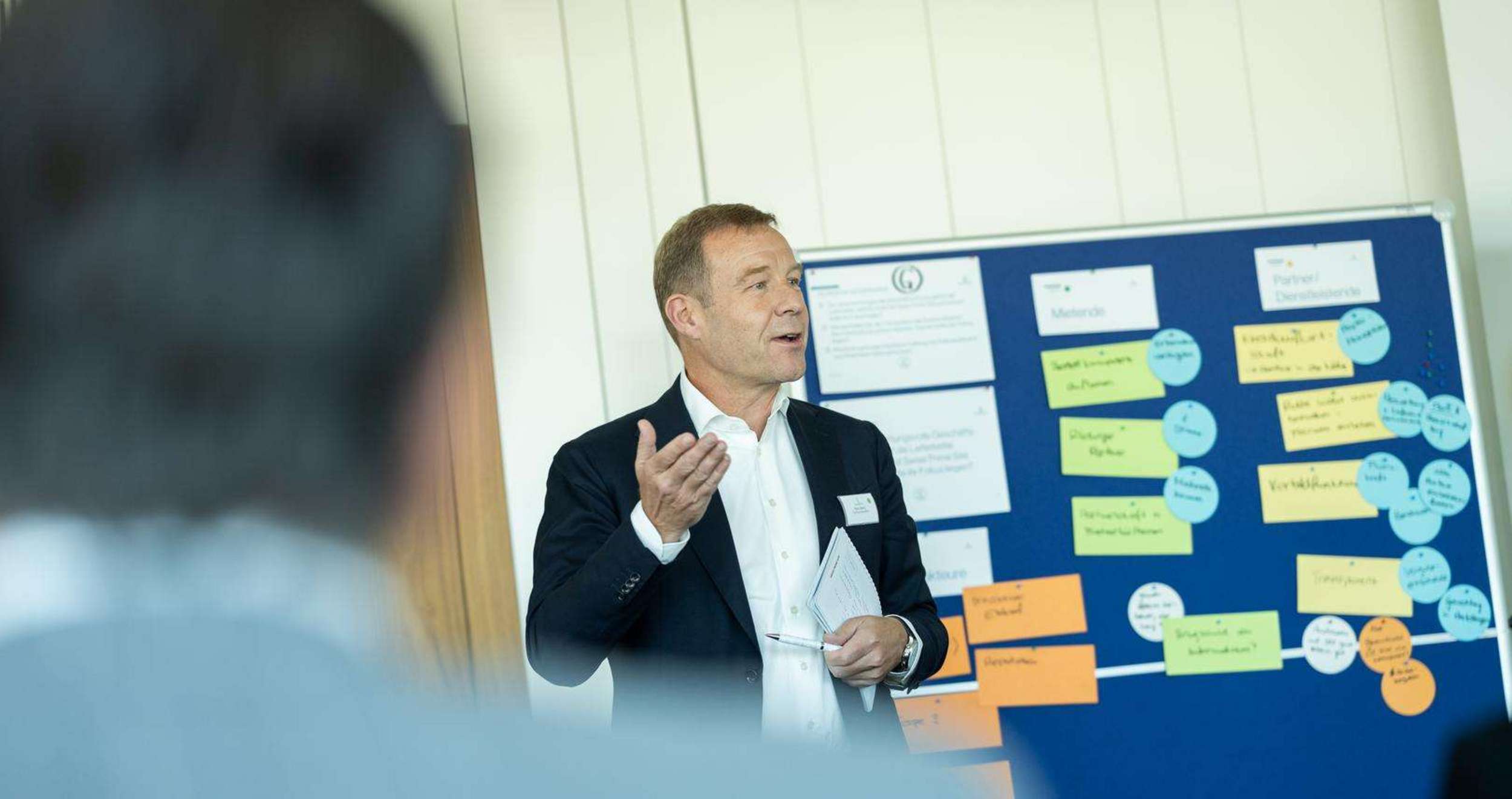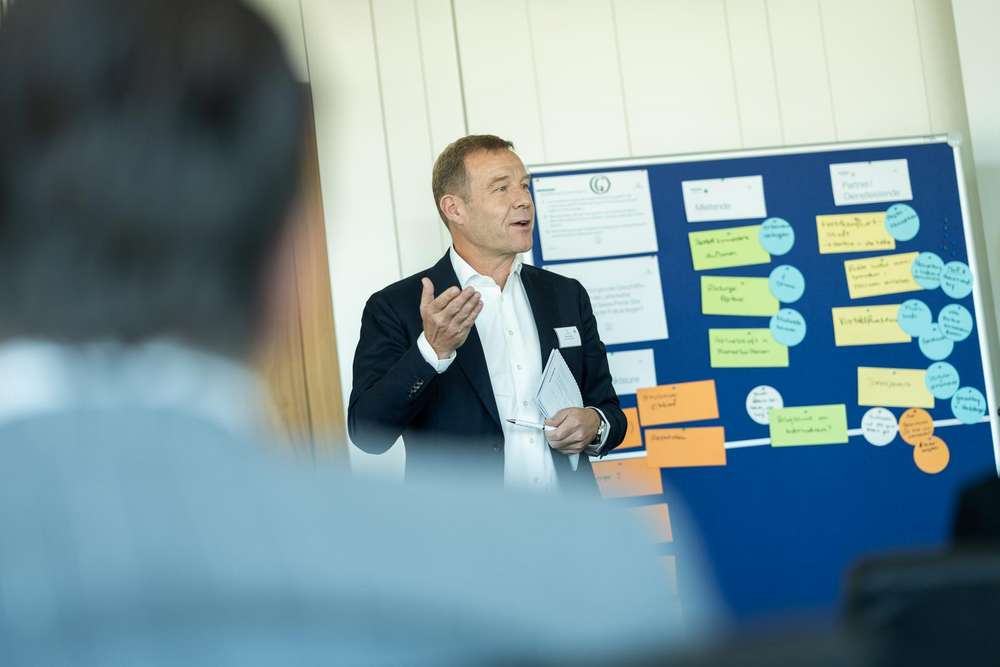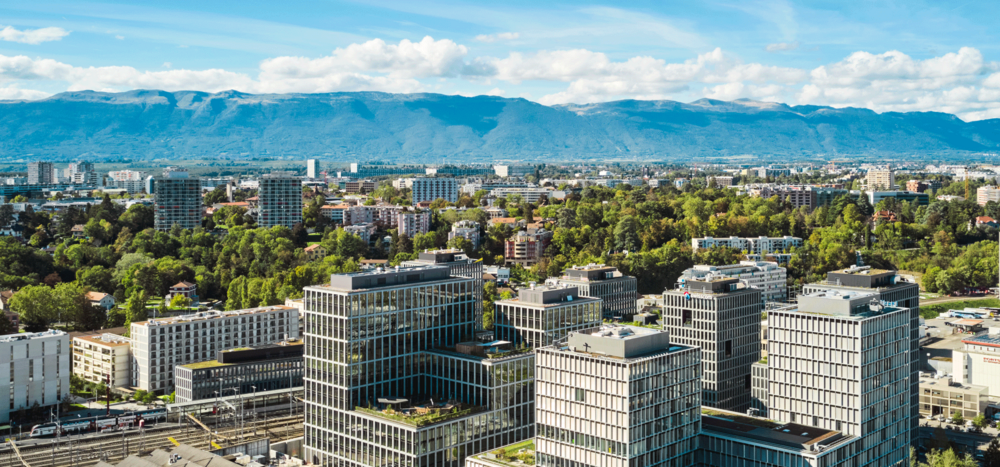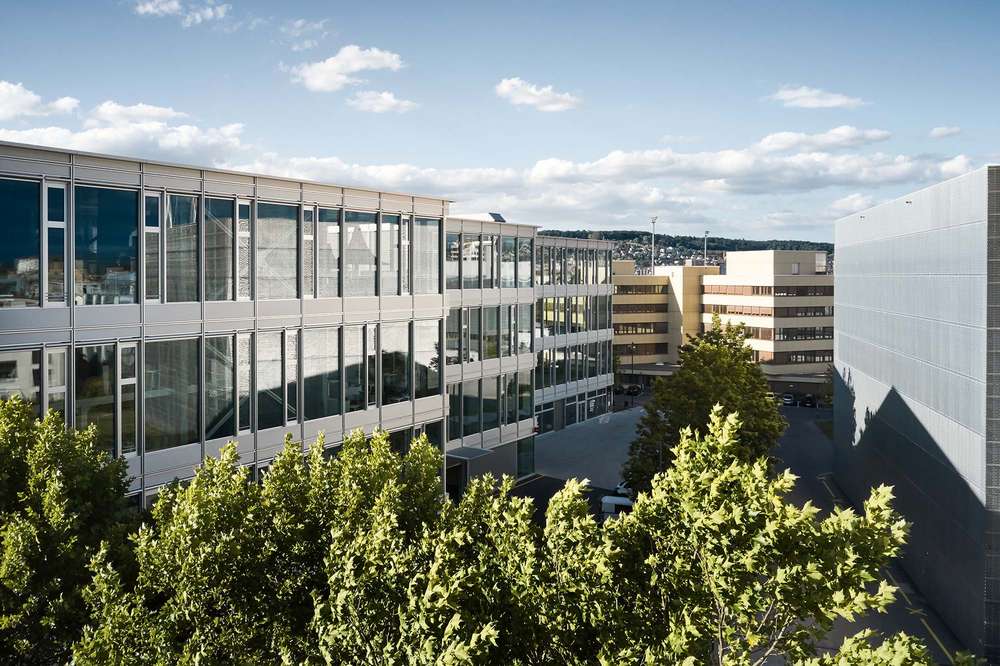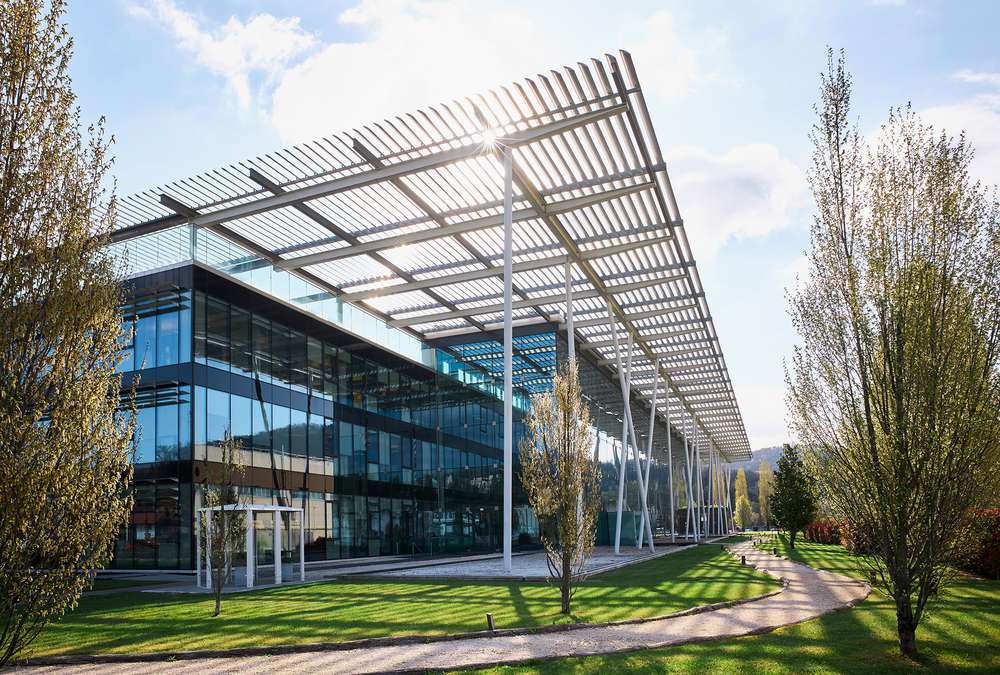«We’re feeling the synergy between the two segments even more.»
How would you sum up 2023, René?
Of course, one major impact on the year was the difficult decision at the start of the year to wind down operational business activities at Jelmoli by the end of 2024. It wasn’t an easy decision for us, but it became the only economically viable option after we were turned down by a large number of potential partners. The sale of Wincasa in May was another key milestone on the group’s journey to becoming a «pure play» real estate company. Here, I’m pleased that we’ve come up with a solution that will provide the Wincasa team with new opportunities and give us the scope to focus. In a challenging market environment, we’ve achieved good operational results in our core business, Real Estate, which once again demonstrates the resilience of our business model. I’m always delighted by the success of our asset managers in the area of new rentals, where we have managed to attract top-notch tenants such as Zurich Insurance and the Canton of Bern. By implementing the rent indexations, we achieved rental growth of 4.3% on a like-for-like basis. This allowed us to keep our operating cash flow (FFO I) stable despite increasing interest rates and asset disposals. We also completed the major projects Alto Pont-Rouge in Geneva and Müllerstrasse in Zürich, which will generate around CHF 26 million in additional rental income for us in 2024. On top of that, we achieved 10% growth in Asset Management and we are now, for the first time ever, closing out the year with more than CHF 8 billion in assets under management – an impressive achievement in my opinion, and one which truly underscores the strength of our team and the Swiss Prime Site brand.
Swiss Prime Site looks significantly different today than it did five years ago. What led to this development?
This is a question we hear often. The original reason for expanding into new business areas was to diversify revenues. But we realised diversification did not really have much of an impact when it was supposed to; for example, during the pandemic, when things weren’t going well for Jelmoli. In fact, the relative complexity of the different business models proved an obstacle to further engagement for many who were involved with Swiss Prime Site. We’re now focusing on what we excel at: developing and letting prime real estate – for ourselves and for third parties. This has gone down very well with our shareholders.
How are things at Jelmoli heading into the closure at the end of 2024?
After the expected initial upheaval, things are running very smoothly eyeing the last year in operation. Such a closure is very hard on the employees, but we’re pulling out all the stops to find a solution which works for everyone. We celebrated the 190th anniversary of the Jelmoli building in 2023 with various campaigns. We deeply appreciate the loyalty of our customers and employees, so we are returning the favour. After the end of the 2024 Christmas season, we will cease operations. The planning and preparatory work for the conversion is in full swing, and we have submitted the application for the building permit. The construction work will begin in 2025, and we are in initial preliminary discussions regarding the letting.
Interest rates have dominated sentiment in the real estate market of late. What’s your assessment of the current situation?
I think there was a certain period of the market finding its feet as far as property investment is concerned. The elevated uncertainty in the interest and inflation environment has been challenging for development projects and transactions. We’re witnessing increased activity in both these areas again, a trend no doubt due to the stabilisation if not fall in interest rates. Clearly capital has become more expensive, but it’s also clear that modern properties in desirable locations are always in demand. And in Switzerland, we’ll be experiencing an excess in demand for the foreseeable future.

«We’re now focusing on what we excel at: developing and letting property in prime locations.»
René Zahnd, CEO Swiss Prime Site
Which brings us to the rental market. How has it been doing?
We’ve seen a clear polarisation in terms of location and quality. Modern buildings in very good locations are easy to let, while lower-quality properties in decentralised locations with poor connections are harder to let. This is especially true for office properties; companies are investing more and more in their employees, especially in a tight labour market. In the retail market, we’re generally seeing a stabilisation, if not a slight improvement – even compared with before the pandemic. We’ve also been expanding our infrastructure segment for some time and focusing on laboratory spaces, which are still in high demand in Basel and the Zurich region. Switzerland as a location is benefiting overproportionately from the growth in the life sciences sector. We can also see, through our Asset Management business, that the residential property market is doing very well. People are renting more again, and so we were able to very successfully let apartments in the residential «Akara-Tower» in Baden, which opened recently.
And what about the transaction market?
We are seeing clear signs that things are steadily improving. First, after a low point in volumes around the turn of 2022/23, sales and purchases are significantly higher again. Second, more institutional buyers are active on the market again, whereas before it was more local buyers with specific property strategies. Third, transactions are getting bigger. This is something we’re observing and also contributing to, with a targeted acquisition alongside the Prime Tower. It’s always important to closely observe what is motivating sales. It’s largely portfolio optimisation – and that goes for us as well – rather than emergency sales for liquidation. Sellers are not willing to make major concessions on prices. This also explains why transactions are continuing at about the same level as the last appraiser estimates. We’re a net seller in the market and in 2023 we again sold buildings for a total of CHF 280 million, with proceeds 7% above the last appraisal value.
The bulk of Swiss Prime Site’s portfolio is in the office and retail sectors. What’s your view of this focus?
We believe that our focus is very well suited to the Swiss market and the current environment, that it’s diversified, and that it allows for growth. The services sector, which is where the majority of jobs are created, generates the highest added value in this country. And here we offer modern office spaces in very good locations – exactly what the market wants. Historically, our portfolio had a significant retail share due to the acquisition of Jelmoli Holding in 2009. We have reduced this over recent years and we anticipate a share of around 20% once the Jelmoli building in Zurich is repositioned. And to be honest, we think this share is attractive: it’s lucrative, defensive, with a lot of retail space for day-to-day needs, and when we talk about our retail, we’re mostly talking about prime locations, particularly in Zurich and Geneva. And in newer types of use, we’ve been very successful with infrastructure properties such as logistics and laboratory spaces. Here, we typically work with major tenants with very specific requirements, and we’ve demonstrated that we’re a customer-oriented partner.
How is work from home evolving in working life and what impact is it having on office occupancy?
Naturally, this is an topic that we frequently discuss with all stakeholders. The world of work has become more flexible and certainly more work is being done from home than before the pandemic. But we’re also seeing that well-connected, high-quality office spaces are more sought after than ever. What is the reason for this? In my opinion, there are several reasons. First, culturally Switzerland is a highly consensus-oriented country and this is also seen in the fact that employees enjoy coming to the office and engaging in dialogue there. And then there’s the fact that commuting times are relatively short, averaging less than 30 minutes, making the journey to the office relatively hassle-free. Third, demand for space is moving away from individual workstations towards communal spaces like meeting rooms, workshops and other shared spaces. Effectively, this often means that more space is needed, not less. And lastly, it’s more important than ever that companies create incentives through good locations with spaces that appeal to employees so that as much work as possible is done on site. Every year, we survey our tenants about the importance of location and quality – in 2023, the figures reached a record high. Interestingly, tenants are talking to us about expansion, even though we know they are simultaneously considering reducing their floor space elsewhere. This is also a reflection of the polarisation taking place in the lettings market. At Swiss Prime Site, we can consider ourselves lucky that we have the right properties in our portfolio.
Let’s move on to Asset Management. Growth there was lower in 2023. How is this business doing?
Overall, we’re extremely satisfied with how our Asset Management department has been performing. We mustn’t forget that the market in 2023 was dominated by restraint and anxiety. Of course, we had higher expectations at the start of the year following a record-breaking 2022. But in a contracting market, we managed to grow our AuM by 9% to CHF 8.4 billion and maintain high levels of profitability with 77% of recurring income. We’ve built a business area which has reached a critical mass with a high level of recurring business. It shows how resilient we are even in a more challenging environment, and that we can still grow.
What products do investors want in Asset Management and which ones are they steering clear of?
What was interesting last year was a certain level of restraint, not only in absolute investment appetite but also in relative preferences. Products for residential properties were in greater demand than those for commercial properties, even though cash flow returns for residential properties were often significantly lower. Pension funds make up a very high proportion of investors in this sector – where it appears the risk profile outweighs the need for distributions. But from conversations with these investors, we’re noticing a change in sentiment, which is becoming stronger and which we think is mainly due to the stabilising interest rate environment. We believe improving sentiment will have a positive impact on the overall investment appetite in the current year – for products in both the residential and commercial sectors.
Where do you see the growth opportunities for new money in Asset Management?
We strongly believe that structural trends will drive further increases in new money. The most important factor here is the growth in population and labour force with an impact on the pension fund system. Most forecasts in both areas are pointing to a growth rate of close to the 1% mark over the coming years. In a country with a high per capita income, this translates to significantly higher membership contributions that have to be invested. Here we’re talking around CHF 20 billion each year, with an upwards trend. We’re also expecting a wide range of playersinstitutional investors to increasingly outsource the management of their real estate investments. Investing in property is becoming increasingly complex due to tightening of sustainability standards and the resulting reporting obligations, coupled with a more challenging market environment overall. This is evident in several in-kind contributions from pension funds that we implemented last year, for instance. I’m particularly pleased that all of these processes were professionally led by advisors and that we prevailed in a competitive environment thanks to our expertise and our combined experience.
How is the real estate fund landscape shaping up after the Credit Suisse takeover?
Concentrated and fragmented at the same time. On the one hand you have UBS, now the only major bank, with a market share of more than 40% in property funds and investment foundations. If you were to focus solely on high-quality properties, the percentage would probably be even higher. This means a concentration on one asset manager, which will prompt many investors to consider the risks involved. On the other hand, the landscape is highly fragmented. Over time, numerous small funds have emerged, largely due to negative interest rates. Now, when higher interest rates mean you need more expertise to make money with real estate, these funds will have less chance of winning over investors. As an independent asset manager, we believe we’re very well positioned to gain market share, both from portfolio reallocations due to concentration and from reallocations due to better returns.
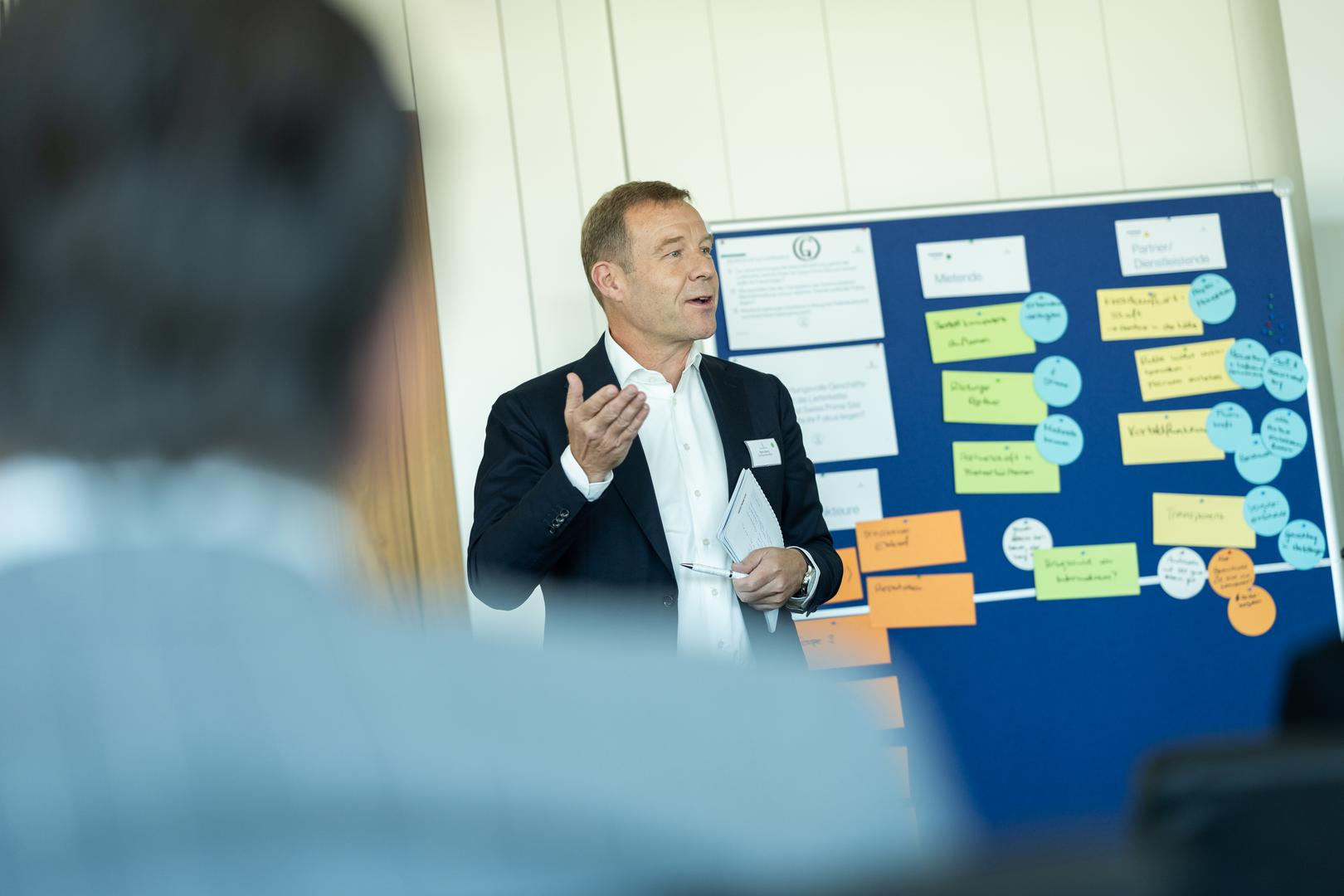
«We offer modern office spaces in very good locations – exactly what the market wants.»
René Zahnd, CEO Swiss Prime Site
How would you characterise the overall interplay between the two segments, your own Real Estate portfolio and Asset Management?
After focusing on the real estate business this year, we’re feeling the synergy from both segments even more. We can effectively leverage our experience and expertise in markets, property strategies and construction projects. Through our Asset Management business, we also have the opportunity of adding value without requiring additional capital of our own. It’s great to see this in the development of the former industrial site in Zuchwil. We can showcase our extensive expertise in the real estate life cycle here by creating a modern residential and commercial district idyllically located on the Aare river. Swiss Prime Investment Foundation is the owner and is letting the first units to a very diverse set of families, working professionals, and local and national companies. Besides our expertise in real estate, we can also build on common structures in the back-office area; utilising economies of scale from the group means we can offer our services in a highly efficient manner.
Swiss Prime Site is one of the largest real estate companies in Switzerland. How are the construction projects and their marketing going?
They’re on track. Last year, we completed two projects that were exemplary in terms of sustainability and neighbourhood development: the Müllerstrasse project in Zurich and the Alto Pont-Rouge project in Geneva. It’s worth noting that we were within our estimates both in terms of timing and costs – a quantitative demonstration of our development expertise. This year, we will conclude additional projects in Basel, Schlieren near Zurich, and in Lugano. We’re now almost 100%let on all projects, which once again demonstrates the current strength of the rental market at our central locations. One project development of major importance to us is Maaglive, a residential tower and community centre next to the Prime Tower in Zurich. Currently, there are two appeals pending against the building permit, but we’re confident we can mount a successful defence without making significant concessions.
The real estate sector will play a crucial role in meeting climate targets. What progress did Swiss Prime Site’s properties make in 2023 in terms of sustainability?
We’ve achieved a great deal in the past year in this area and we are on track for our longterm goals. All eligible space is covered by environmental certificates issued by external assessors, and we’ve reduced the emission intensity of our portfolio by 10%; it currently stands at 15.2 kg CO2/m2. This is well below the linear pathway to net zero by 2040. We’ve thoroughly planned our upgrade and renovation measures and we are already anticipating a significant improvement in 2024. Last year, we attracted scores of tenants for green leases – leases with mutual commitment to climate-friendly measures – and we are currently at 55% of our total space, with the aim of reaching 100% by 2025. In the circular economy, naturally we’re aware of our particular responsibility as a major developer and we have also made significant progress here. The Müllerstrasse renovation project gave us the chance to demonstrate what is possible with circular construction: we recycled 90% of the concrete, which alone saved 2 600 tonnes of CO2 emissions.
You made another purchase for your own portfolio in 2023 after a long pause. Is Swiss Prime Site now becoming more active in this space?
The purchase of the state-of-the-art office property near the Prime Tower was a unique opportunity. We’ve always said we would evaluate acquisitions very selectively, to complement our growth from developments. The Fifty-One building fits perfectly into our portfolio near the Maag site, and we’re always optimising our portfolio in terms of location and building standard. Along with the Maaglive development project, we are creating a unique campus here with a blend of sustainable living and working spaces, and attractive green and recreational areas. But this transaction doesn’t signal a strategic shift. We will continue to focus largely on the sales side and we will only consider very selective purchases of additional assets for our own portfolio. With Swiss Prime Site Solutions on the Asset Management side, we will, of course, become more active again with fresh capital.
Where do you see risks in the portfolio? And where are the biggest opportunities?
The biggest risk for us at the moment would be a general recession with high levels of unemployment, a significant loss of purchasing power, and a decline in industrial output. But we currently consider such a scenario to be relatively unlikely. Economic activity in Switzerland is proving itself highly resilient, if somewhat subdued. And because our portfolio is so well diversified, with a wide range of industries and more than 2 000 tenants, we consider ourselves very well positioned even in the event of a downturn in individual sectors. On the other hand, we see the much-discussed «10-million Switzerland» as a very realistic scenario in the not-so-distant future. We consider this to be a major opportunity for Swiss Prime Site. Ten million people will need space for living, working, shopping and going out. Space here is limited by the topography, so we simply need to make better use of what we have. Existing sites will become more valuable and development of new sites will bring us growth. And that brings us back to our core competency: we create living spaces!
